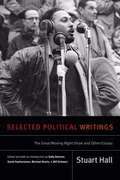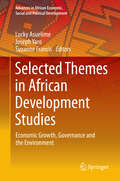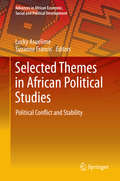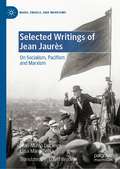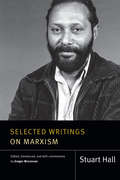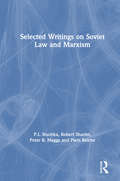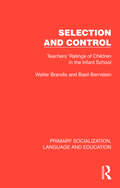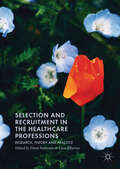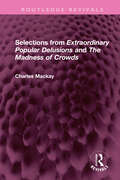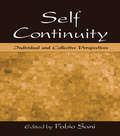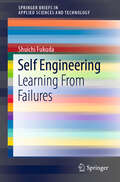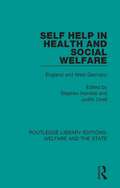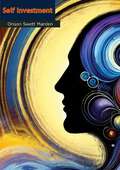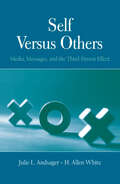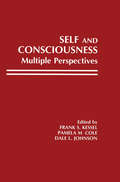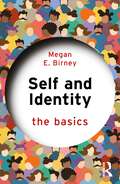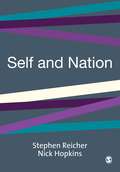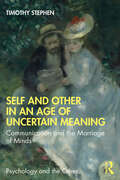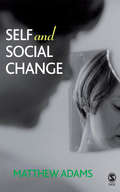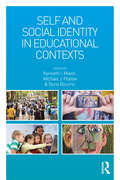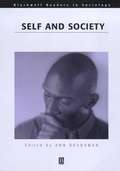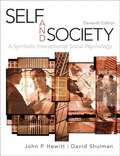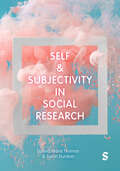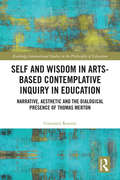- Table View
- List View
Selected Political Writings: The Great Moving Right Show and Other Essays
by Stuart Hall Bill Schwarz David Featherstone Michael RustinSelected Political Writings gathers Stuart Hall's best-known and most important essays that directly engage with political issues. Written between 1957 and 2011 and appearing in publications such as New Left Review and Marxism Today, these twenty essays span the whole of Hall's career, from his early involvement with the New Left, to his critique of Thatcherism, to his later focus on neoliberalism. Whether addressing economic decline and class struggle, the Cuban Missile Crisis, or the politics of empire, Hall's singular commentary and theorizations make this volume essential for anyone interested in the politics of the last sixty years.
Selected Themes in African Development Studies
by Lucky Asuelime Suzanne Francis Joseph YaroAgainst the background of realities of underdevelopment and economic growth, environmental pressures and global governance challenges, this volume presents a broad picture of contemporary issues in African development. The multi-disciplinary collection presents a variety of important themes, covering land questions, housing, water, health, economic liberalization, climate, environment, and gender. The specific country studies illustrate the diversity of the African continent and demonstrate how unique contexts impact upon different levels of achievement. The volume seeks to present and promote novel analytical frameworks, new conceptual approaches, and empirical accounts of relevance to scholars studying Africa as well as practitioners in African development and policy makers.
Selected Themes in African Political Studies
by Lucky Asuelime Suzanne FrancisAgainst the background of a long and continuing record of political instability in Africa, this edited collection presents a multi-disciplinary approach to selected issues in African political studies. The contributions explore a range of political and conflict situations, discuss efforts to develop indigenous conflict resolution mechanisms and consider some of the key political and economic issues facing the continent. The specific country studies illuminate the diversity of the African continent and indicate the ways in which the political and socio-economic contexts of African states bear directly upon the ability of states to solve political and economic challenges. The volume seeks to present and promote novel analytical frameworks, conceptual approaches and empirical accounts of relevance to scholars working on Africa and to practitioners and policy makers in politics, governance and peace initiatives in Africa.
Selected Writings of Jean Jaurès: On Socialism, Pacifism and Marxism (Marx, Engels, and Marxisms)
by Jean-Numa Ducange Elisa MarcobelliThis book is an anthology of the writings of Jean Jaurès, a central figure of French socialism in the period leading up to World War I, who was born in 1859 and died in 1914, a few days before the outbreak of the conflict. Jaurès is one of the most celebrated politicians in France. His writings in this anthology touch on the subjects dear to him, which are then some of the great political themes of his time. In this book are writings on war and pacifism, on colonialism and anti-colonialism, and on the central themes of socialism of the time, such as reformism and revolution. Despite Jaurès's notoriety in France, he is not well known abroad. This book, a corpus of his emblematic writings, aims, to make Jaurès known to those who do not know him outside of France.
Selected Writings on Marxism (Stuart Hall: Selected Writings)
by Stuart HallThroughout his career Stuart Hall engaged with Marxism in varying ways, actively rethinking it to address the political and cultural exigencies of the moment. This collection of Hall's key writings on Marxism surveys the questions central to his interpretations of and investments in Marxist theory and practice. It includes Hall's readings of canonical texts by Marx and Engels, Gramsci, and Althusser; his exchanges with other prominent thinkers about Marxism; his use of Marxist frameworks to theorize specific cultural phenomena and discourses; and some of his later work in which he distanced himself from his earlier attachments to Marxism. In addition, editor Gregor McLennan's introduction and commentary offer in-depth context and fresh interpretations of Hall's thought. Selected Writings on Marxism demonstrates that grasping Hall's complex relationship to Marxism is central to understanding the corpus of his work.
Selected Writings on Soviet Law and Marxism
by Piers Beirne Peter B. Maggs Robert Sharlet P.I. StuchkaThe Latvian-born legal theorist P.I. Stuchka (1865-1932), generally recognized as one of the principal architects of modern Soviet legal theory and the Soviet legal system itself, was a prodigious author and editor. Twenty essays by Stuchka written between 1917 and 1931 were selected for translation
Selection and Control: Teachers' Ratings of Children in the Infant School (Primary Socialization, Language and Education)
by Basil Bernstein Walter BrandisOriginally published in 1974, Selection and Control: Teachers' Ratings of Children in the Infant School consists of an analysis of teachers’ ratings of children in a middle-class and in a working-class area at the end of their first year and the end of second year of life in the infant school. Presented in two parts, Part One is highly technical as it sets out in some detail the logic of the statistical description. Part Two gives one interpretation of the findings as these might throw light upon differences in the patterns of the teachers’ judgments in the middle-class and working-class area. The results of the maternal interview given in the Appendix show very clearly major class differences in the reported preparation of the child for the current educational experience of the infant school. Today it can be read in its historical context.
Selection and Recruitment in the Healthcare Professions: Research, Theory and Practice
by Lara Zibarras Fiona PattersonHow we recruit future healthcare professionals is critically important, as the demand for high quality healthcare increases across the globe. This book questions what the evidence tells us about how best to select those most suited to a career in healthcare, ensuring that the approaches used are relevant and fair to all who apply.The editors of this collection take a comprehensive look at the latest research surrounding recruitment and selection into healthcare roles. Each chapter is authored by leading experts and, using international case material, the practical implications for workforce policy are explored. They review the key stages in designing effective selection systems and discuss how best to evaluate the quality of selection processes. Evidence from role analysis studies as well as the effectiveness of different selection methods including aptitude and situational judgment tests, personality assessment and interviews are examined. Chapters also cover approaches to student selection and recruitment for postgraduate trainees through to senior appointments. Finally they highlight contemporary issues in recruitment, including the use of technology, selecting for values, candidate perceptions, coaching issues and how best to promote diversity and widening access.
Selections from 'Extraordinary Popular Delusions' and 'The Madness of Crowds': Selections From Memoirs Of Extraordinary Popular Delusions And The Madness Of Crowds (Routledge Revivals)
by Charles MackayThis selection, first published in 1973, compiles a fascinating study of crowd psychology as it examines the moral epidemics and fits of madness that have bewitched the cities of Europe and their citizens from the dark ages to modern times. Among the selections are tales of thieves and poisoners, demons and poltergeists mingled with all the crazes, fantasies, divinations and prophecies that have stunned the critical faculties.
Self Continuity: Individual and Collective Perspectives
by Fabio SaniThis volume is the first to bring together the fast-growing research on self-continuity from multiple perspectives within and beyond social psychology. The book covers individual and collective aspects of self-continuity, while a final section explores the relationship between these two forms. Topics include environmental and cultural influences on self-continuity; the interplay of autobiographical memory and personal self-continuity; the psychological function of self-continuity; personal and collective self-continuity; and resistance to change. The volume is rounded off with commentaries on the central issues and themes that have been discussed. The book provides a unique sourcebook for this important topic and will appeal not only to upper-level students and researchers in social psychology, but, in view of the multiple perspectives represented in the volume, it will also appeal to cognitive, developmental, and personality psychologists.
Self Engineering: Learning From Failures (SpringerBriefs in Applied Sciences and Technology)
by Shuichi FukudaThis book demonstrates how the creation of emotional satisfaction will change in tomorrow’s connected, IoT world. The importance of emotional satisfaction will increase in the IoT Connected Society of World 2.0, in which humans and machines work together as members of the same team with no walls between the two, and where production is also team-based. Developing emotional satisfaction in such a diverse team and in a very different environment is a major challenge and needs to be studied from a broad perspective. This book describes the emerging issues and how they can be to tackled, introducing paths for moving beyond static value toward developing dynamic value.
Self Help in Health and Social Welfare: England and West Germany (Routledge Library Editions: Welfare and the State #8)
by Stephen Humble Judith UnellOriginally published in 1989, Self Help in Health and Social Welfare looks at the current World Health Organization policy that encourages self-help in health. The book suggests that this can more readily be achieved by international collaboration and exchange of ideas. England and West Germany are both advanced industrialized societies with complex and highly developed health and social welfare systems and resilient voluntary sectors. Much can therefore be learnt by comparing their experiences. This book reports developments and initiatives from these two countries, covering issues such as the institutional context, evaluating self-help, public policy and support for self-help.
Self Investment
by Orison Swett MardenTransform your life by investing in your greatest asset—yourself—with Orison Swett Marden’s empowering book, "Self-Investment." This inspiring work offers timeless wisdom and practical advice on personal development, encouraging readers to cultivate their inner strengths and realize their fullest potential.Orison Swett Marden, a pioneering figure in the self-help movement and an influential author, emphasizes the importance of self-investment as the foundation for success and fulfillment. In "Self-Investment," Marden explores the key principles of personal growth, including the development of self-discipline, the power of a positive mindset, and the importance of continuous learning.Through engaging anecdotes and motivational insights, Marden illustrates how self-investment leads to greater confidence, resilience, and achievement. He provides practical strategies for setting and reaching goals, overcoming obstacles, and maintaining a healthy work-life balance. Marden’s guidance helps readers understand that investing in oneself is the most effective way to create a life of purpose and satisfaction."Self-Investment" covers a wide range of topics, from the cultivation of intellectual and emotional intelligence to the importance of physical health and well-being. Marden emphasizes the interconnectedness of these aspects, showing how a holistic approach to self-investment can lead to a more balanced and successful life.Marden’s writing is both inspirational and actionable, making complex concepts accessible and applicable to daily life. His teachings encourage readers to take proactive steps towards personal and professional growth, highlighting the significance of self-belief and perseverance.This book is an essential read for anyone looking to enhance their personal and professional lives. Whether you are a student, an entrepreneur, a professional, or someone seeking to improve your overall well-being, "Self-Investment" offers the tools and motivation needed to invest wisely in your future.Join Orison Swett Marden on a journey of self-discovery and empowerment, and learn how to invest in yourself to achieve lasting success and fulfillment. With "Self-Investment," you can unlock your potential and create the life you’ve always dreamed of.
Self Versus Others: Media, Messages, and the Third-Person Effect (Routledge Communication Series)
by Julie L. Andsager H. Allen WhiteSelf Versus Others explores the third-person effect and its role in media as a means of persuasion. This scholarly work synthesizes more than two decades of research on the third-person effect, the process in which individuals do not perceive themselves to be impacted by particular messages—such as persuaded to engage in risky behaviors or encouraged to be violent—but they believe others will be. Authors Julie L. Andsager and H. Allen White focus their analysis specifically on the role of media and media messages, and assert that the third-person effect functions as a means of persuasion. They explore the underlying concepts and connections this effect shares with established theories of persuasion and mediated communication. The only volume to date focusing on the topic, Self Versus Others demonstrates the significant impact persuasion has on public opinion, behavior, and policy. As such, understanding the means through which persuasion can be accomplished thereby provides a powerful tool. Timely and succinct, this book:*provides thorough synthesis of third-person effect literature;*argues that systematic versus heuristic processing underlies third-person perceptions; and*conceptually links third-person effects with co-orientation. Intended for communication scholars with an interest in persuasion, as well as those in key areas including mass communication, health communication, and political communication, this book is also appropriate for advanced courses in persuasion, communication theory, and campaigns.
Self and Consciousness: Multiple Perspectives
by Dale L. Johnson Pamela M. Cole Frank S. KesselThis volume contains an array of essays that reflect, and reflect upon, the recent revival of scholarly interest in the self and consciousness. Various relevant issues are addressed in conceptually challenging ways, such as how consciousness and different forms of self-relevant experience develop in infancy and childhood and are related to the acquisition of skill; the role of the self in social development; the phenomenology of being conscious and its metapsychological implications; and the cultural foundations of conceptualizations of consciousness. Written by notable scholars in several areas of psychology, philosophy, cognitive neuroscience, and anthropology, the essays are of interest to readers from a variety of disciplines concerned with central, substantive questions in contemporary social science, and the humanities.
Self and Identity: The Basics (The Basics)
by Megan E. BirneySelf and Identity: The Basics is a jargon-free and accessible introduction that draws on key theories and ideas in Social Psychology to explore the ways that other people affect our thoughts, feelings, and behaviours. Highlighting selfhood as a function of identity, the book shows that it is our relationships with others in our social world that largely determine who we are. "Who am I?" It’s a question that most all humans have grappled with at some point or another. This book seeks to answer this question through relatable examples that show how psychological theory can be applied to our own lives. It considers the philosophical and psychological context in which ideas about selfhood have developed and reviews the ways that the people around us, and the groups that we belong to, affect who we are. Finally, these ideas are considered in the context of real-world phenomena and behaviours; for instance, how we use language, conflict between groups, and social influence. With a glossary of key terms, suggestions for further reading, and chapter summaries, this book is an ideal introduction for students of social psychology and related fields. It will be of interest to anyone who wants to gain social psychological insight into who they are and how others got them there.
Self and Nation: Categorization, Contestation and Mobilization
by Stephen D. Reicher Dr Nick Hopkins`Here is a rare book, a truly helpful piece of work on the psychology of nationalism. Stephen Reicher and Nick Hopkins, of St Andrews and Dundee Universities, focus much of their study of recent Scottish experience, drawing on inter-views with political activists. The cast light on why our `Unionists' and nationalists feel so sure their side represents our national identity and the other lot doesn't. For once it is a compliment to say a book raises more questions than it answers. Stephen Reicher and Nick Hopkins open up large questions closer inspection' - Glasgow Herald `In this impressive book Stephen Reicher and Nick Hopkins draw from a wealth of research to address issues of nationality, national identity and nationalism that lie at the heart of core topics in social psychology and its cognate disciplines. They have produced a powerful and scholarly text that interweaves an abundance of rich empirical data with a broad-reaching and timely theoretical statement. Moreover, the content is not confined to matters of national identity but also extends to treatments of stereotyping, prejudice, intergroup conflict, leadership, collective action, and the self .... For all these reasons, the book should serve essential and compelling reading for a very broad audience' - S Alexander Haslam, Australian National University `Stephen Reicher and Nick Hopkins write with elegance and clarity, drawing the reader into their argument, without losing any of its complexity and nuance. This book deserves to make a major impact in studies of nationalism. It ought to become a classic.... I'm quite bowled over - it's really brilliant' - David McCrone, Edinburgh University
Self and Other in an Age of Uncertain Meaning: Communication and the Marriage of Minds (Psychology and the Other)
by Timothy StephenSelf and Other in an Age of Uncertain Meaning explores the nature and origins of widespread problems of self in modern societies. It examines the paradoxical interplay between the modern world's many benefits and freedoms, and its mounting social challenges and psycho-emotional impacts. Over time the character of consciousness has shifted in concert with societal trends. The experienced world has become more nuanced, fragmented, and uncertain, as well as increasingly personal and intimate, reshaping social relationships. Chapters analyze the interdependence of language, mind, intimacy, the self, and culture, arguing that as the coevolution of these five factors produced the modern world, many features of contemporary culture have become disruptive to security of being. The book explores the importance to the vital sense of self in constructing relationships based in mutual recognition of moral and intellectual equality between partners.Rich with examples from everyday experience, this text offers profound insights for those interested in sociology, psychoanalysis, psychology, communication, history, and culture.
Self and Social Change
by Dr Matthew Adams'This is a superb book; beautifully written, lucid, and engaging, with illuminating critical discussions of the concept of reflexivity, psychoanalytic perspectives, and Foucaultian analysis, locating these theories in up-to-date research and discussions about class and gender. This book will be indispensable as an aid to students looking for an introduction to concepts of the self set in contemporary everyday contexts that they can relate to. But it will also be useful to teachers and researchers looking for orientation in a complex and burgeoning field of literature and research' - Ian Burkitt, University of Bradford 'Matthew Adams provides a clearly written and concise summary of key theoretical accounts of the meaning of social change for psychic life and the experience of self... Self and Social Change is a terrific book. If looking for an accessible introductory text, look no further' - British Journal of Sociology How does social change influence selfhood? What are the fundamental positions in social theories of the self? How are social changes interwoven with our ability to choose our identities and lifestyles? This accessible and assured book gives readers a new take on the fundamental question of the relation between the individual and society. By offering a thorough, informed and critical guide to the field, Adams demonstrates how global economic and employment structures, neo-liberal discourse, the role of emotion, irrationality and ambiguity are factors that impact upon the shape and resilience of the self. Anyone interested in the question of identity and its relation to cultural, social, economic and political contexts will find this book a God-send, making it ideal for students and lecturers in cultural studies, sociology, social psychology and communications.
Self and Social Identity in Educational Contexts
by Kenneth I. Mavor, Michael J. Platow and Boris BizumicThis innovative volume integrates social identity theory with research on teaching and education to shed new and fruitful light on a variety of different pedagogical concerns and practices. It brings together researchers at the cutting edge of new developments with a wealth of teaching and research experience. The work in this volume will have a significant impact in two main ways. First and foremost, the social identity approach that is applied will provide the theoretical and empirical platform for the development of new and creative forms of practice in educational settings. Just as the application of this theory has made significant contributions in organisational and health settings, a similar benefit will accrue for conceptual and practical developments related to learners and educators – from small learning groups to larger institutional settings – and in the development of professional identities that reach beyond the classroom. The chapters demonstrate the potential of applying social identity theory to education and will stimulate increased research activity and interest in this domain. By focusing on self, social identity and education, this volume investigates with unprecedented clarity the social and psychological processes by which learners’ personal and social self-concepts shape and enhance learning and teaching. Self and Social Identity in Educational Contexts will appeal to advanced students and researchers in education, psychology and social identity theory. It will also be of immense value to educational leaders and practitioners, particularly at tertiary level.
Self and Society
by Ann BrananmanThe readings collected here illustrate four core topics of sociological social psychology and these topics constitute the four parts of the book.
Self and Society: A Symbolic Interactionist Social Psychology
by John P. Hewitt; David ShulmanThis book has been used not only in the classroom, but also cited in literature as an authoritative source. Self and Society is not a distillation of textbook knowledge, but rather, a thoughtful, well-organized presentation that makes its own contribution to the advancement of symbolic interactionism.
Self and Subjectivity in Social Research
by Donna Maria Thomas Sarah DurstonThis is a book that thinks about what it means to be human and what this could mean for social research. Addressing ontological shifts across the social sciences, the book reconsiders the nature of self, experience and social reality and their implications for doing research differently. It delves into wide-ranging topics from the self in crisis, through the self and the nature of language, to ethics and the self. The book also: Helps you understand epistemology and ontology in practice with case studies of real world research; Critiques dominant approaches and examines global perspectives and contexts that challenge them; Explores the potential of interdisciplinary approaches to resolve tensions in social research; Discusses how ontology can shape research practice, policy development and social support systems. This book will help postgraduate students, academics, researchers and teachers embrace new ways of thinking about self and subjectivity. Donna M. Thomas is a Research Fellow at the University of Central Lancashire and Co-director of ICreateS International Research Unit & Research. Sarah Durston is head of the Sentience and Science Foundation, the Netherlands, honorary professor at UCLan and co-director of the ICreateS research unit, and professor in developmental neuroscience at Utrecht University, the Netherlands.
Self and Subjectivity in Social Research
by Donna Maria Thomas Sarah DurstonThis is a book that thinks about what it means to be human and what this could mean for social research. Addressing ontological shifts across the social sciences, the book reconsiders the nature of self, experience and social reality and their implications for doing research differently. It delves into wide-ranging topics from the self in crisis, through the self and the nature of language, to ethics and the self. The book also: Helps you understand epistemology and ontology in practice with case studies of real world research; Critiques dominant approaches and examines global perspectives and contexts that challenge them; Explores the potential of interdisciplinary approaches to resolve tensions in social research; Discusses how ontology can shape research practice, policy development and social support systems. This book will help postgraduate students, academics, researchers and teachers embrace new ways of thinking about self and subjectivity. Donna M. Thomas is a Research Fellow at the University of Central Lancashire and Co-director of ICreateS International Research Unit & Research. Sarah Durston is head of the Sentience and Science Foundation, the Netherlands, honorary professor at UCLan and co-director of the ICreateS research unit, and professor in developmental neuroscience at Utrecht University, the Netherlands.
Self and Wisdom in Arts-Based Contemplative Inquiry in Education: Narrative, Aesthetic and the Dialogical Presence of Thomas Merton (Routledge International Studies in the Philosophy of Education)
by Giovanni RossiniBy foregrounding a first-person perspective, this text enacts and explores self-reflection as a mode of inquiry in educational research and highlights the centrality of the individual researcher in the construction of knowledge. Engaging in particular with the work of Thomas Merton through a dialogical approach to his writings, Self and Wisdom in Arts-Based Contemplative Inquiry in Education offers rich examples of personal engagement with text and art to illustrate the pervasive influence of the personal in reflective, narrative, and aesthetic forms of inquiry. Chapters consider methodological and philosophical implications of self-study and contemplative research in educational contexts, and show how dialogic approaches can enrich empirical forms of inquiry, and inform pedagogical practice. In its embrace of a contemplative voice within an academic treatise, the text offers a rich example of arts-based contemplative inquiry. This unique text will be of interest to postgraduate scholars, researchers, and academics working in the fields of educational philosophy, arts-based and qualitative research methodologies and Merton studies.
